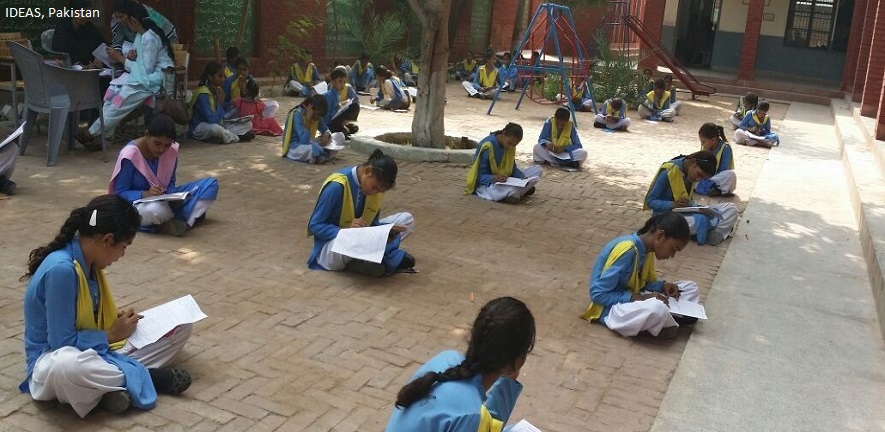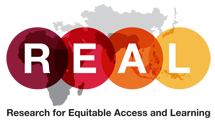
TEACh research instruments
Instruments developed for the TEACh project (ESRC-DFID project code: ES/M005445/1) shared on this webpage are an Open Educational Resource and are licensed under Creative Commons license which allows reuse and adaptations of these instruments on the basis that you acknowledge the TEACh project as the original source of instruments, share any adapted instruments with the research team (REALCentre@educ.ac.uk), and do not use these instruments for commercial purposes (guidelines for what constitutes commercial use can be found here).
These instruments can be modified for use in other countries taking into account contextual and cultural variations, and can be translated into appropriate languages.
The open educational instruments were designed to be used in conjunction with the learning assessments, to understand a range of household, child and school characteristics, with children between 8-to-12 years of age in Pakistan (province of Punjab) and India (state of Haryana). Learning outcomes were measured using the Annual Status of Education Report (ASER) and Young Lives numeracy and literacy tests, non-verbal ability (Ravens Coloured Progressive Matrices; Raven, 1965), peer-relationships and academic self-assessment (Young Lives, 2017), self-perceived self-esteem and peer-relations (Harter and Pike, 1984).
Household survey
The Household survey was designed to give a background of each child and other household members. The survey covers background on the household’s assets, education and employment status, religion, caste, and mother’s literacy level, mother’s beliefs and perceptions towards schooling for children from different backgrounds, child’s school history, child’s time spent working, household spending on the child’s education, the child’s functioning abilities (using the child functioning questions developed by the Washington Group on Disability Statistics).
Please cite the original contributions on this source as Rose, P., Aslam, M., Bari, F., De, A., Hofmann, R., Malik, R., Rawal, S., Samson, M., Singal, N., Vignoles, A. (2018) Household survey, English version, Urdu version, Cambridge: TEACh (Teaching Effectively All Children). Licensed under Creative Commons Attribution-NonCommercial 4.0 International.
Village survey
The village survey was designed to be administered in each of the villages included in the sample. The survey is designed to give a background of the village, the village population characteristics (such as prevalence of children with disabilities), village infrastructure, village access to economic, social and health services, importance of livelihood occupation for villagers, government or NGO sponsored development programmes within the village.
Please cite the original contributions on this source as Rose, P., Aslam, M., Bari, F., De, A., Hofmann, R., Malik, R., Rawal, S., Samson, M., Singal, N., Vignoles, A. (2018) Village survey, Cambridge: TEACh (Teaching Effectively All Children). Licensed under Creative Commons Attribution-NonCommercial 4.0 International.
Teacher survey
The teacher survey was designed to gain background information the teachers who taught grades 3-5 children included in the TEACh project. The survey assesses demographic information about the teacher, professional development, in-house training and job satisfaction, quality of relationships the teacher held with co-workers, the community and school leaders, leadership in the school, teachers’ practices in the classroom, their beliefs and attitudes relating to students from different backgrounds (gender, poverty and disability) and their own competencies as a teacher.
Please cite the original contributions on this source as Rose, P., Aslam, M., Bari, F., De, A., Hofmann, R., Malik, R., Rawal, S., Samson, M., Singal, N., Vignoles, A. (2018) Teacher survey, Cambridge: TEACh (Teaching Effectively All Children). Licensed under Creative Commons Attribution-NonCommercial 4.0 International.
School information survey
The school information survey was designed to gain general information about each of the schools included in the sample, such as enrolment by gender, when the school was established, information about the teachers at the school, class size, number of children repeating a school year, number of pupils attending school over a two day period, health and wellbeing checks provided and administer to the children.
Please cite the original contributions on this source as Rose, P., Aslam, M., Bari, F., De, A., Hofmann, R., Malik, R., Rawal, S., Samson, M., Singal, N., Vignoles, A. (2018) School information survey, Cambridge: TEACh (Teaching Effectively All Children). Licensed under Creative Commons Attribution-NonCommercial 4.0 International.
School observation survey
The school observation survey was designed to gain information about the school facilities (such as a library and sanitation facilities) and infrastructure (for example, for children with disabilities to access the school), the classroom facilities and resources (such as chairs and desks) and the structure of a school day.
Please cite the original contributions on this source as Rose, P., Aslam, M., Bari, F., De, A., Hofmann, R., Malik, R., Rawal, S., Samson, M., Singal, N., Vignoles, A. (2018). School observation survey, Cambridge: TEACh (Teaching Effectively All Children). Licensed under Creative Commons Attribution-NonCommercial 4.0 International.
Child background questionnaire (in school)
The child background questionnaire was administered to children in school to collect information such as education level and occupation of household members, household assets (a sub-set of information collected in the household), the child’s functioning abilities in the classroom (for example, difficulty seeing the board).
Please cite the original contributions on this source as Rose, P., Aslam, M., Bari, F., De, A., Hofmann, R., Malik, R., Rawal, S., Samson, M., Singal, N., Vignoles, A. (2018). Child background questionnaire, Cambridge: TEACh (Teaching Effectively All Children). Licensed under Creative Commons Attribution-NonCommercial 4.0 International.

